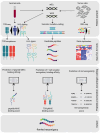Artificial intelligence and neoantigens: paving the path for precision cancer immunotherapy
- PMID: 38868767
- PMCID: PMC11167095
- DOI: 10.3389/fimmu.2024.1394003
Artificial intelligence and neoantigens: paving the path for precision cancer immunotherapy
Abstract
Cancer immunotherapy has witnessed rapid advancement in recent years, with a particular focus on neoantigens as promising targets for personalized treatments. The convergence of immunogenomics, bioinformatics, and artificial intelligence (AI) has propelled the development of innovative neoantigen discovery tools and pipelines. These tools have revolutionized our ability to identify tumor-specific antigens, providing the foundation for precision cancer immunotherapy. AI-driven algorithms can process extensive amounts of data, identify patterns, and make predictions that were once challenging to achieve. However, the integration of AI comes with its own set of challenges, leaving space for further research. With particular focus on the computational approaches, in this article we have explored the current landscape of neoantigen prediction, the fundamental concepts behind, the challenges and their potential solutions providing a comprehensive overview of this rapidly evolving field.
Keywords: artificial intelligence; cancer immunotherapy; immunopeptidomics; neoantigen prediction; precision medicine.
Copyright © 2024 Bulashevska, Nacsa, Lang, Braun, Machyna, Diken, Childs and König.
Conflict of interest statement
The authors declare that the research was conducted in the absence of any commercial or financial relationships that could be construed as a potential conflict of interest.
Figures




Similar articles
-
Neoantigen identification strategies enable personalized immunotherapy in refractory solid tumors.J Clin Invest. 2019 Mar 5;129(5):2056-2070. doi: 10.1172/JCI99538. Print 2019 May 1. J Clin Invest. 2019. PMID: 30835255 Free PMC article.
-
Advancing precision medicine: the transformative role of artificial intelligence in immunogenomics, radiomics, and pathomics for biomarker discovery and immunotherapy optimization.Cancer Biol Med. 2025 Jan 2;22(1):33-47. doi: 10.20892/j.issn.2095-3941.2024.0376. Cancer Biol Med. 2025. PMID: 39749734 Free PMC article. Review.
-
Personalized cancer vaccine design using AI-powered technologies.Front Immunol. 2024 Nov 8;15:1357217. doi: 10.3389/fimmu.2024.1357217. eCollection 2024. Front Immunol. 2024. PMID: 39582860 Free PMC article. Review.
-
Shared neoantigens: ideal targets for off-the-shelf cancer immunotherapy.Pharmacogenomics. 2020 Jun;21(9):637-645. doi: 10.2217/pgs-2019-0184. Epub 2020 May 19. Pharmacogenomics. 2020. PMID: 32423288 Review.
-
Advances and challenges in neoantigen prediction for cancer immunotherapy.Front Immunol. 2025 Jun 12;16:1617654. doi: 10.3389/fimmu.2025.1617654. eCollection 2025. Front Immunol. 2025. PMID: 40574862 Free PMC article. Review.
Cited by
-
Circular RNAs as Targets for Developing Anticancer Therapeutics.Cells. 2025 Jul 18;14(14):1106. doi: 10.3390/cells14141106. Cells. 2025. PMID: 40710359 Free PMC article. Review.
-
Integrating AI into Cancer Immunotherapy-A Narrative Review of Current Applications and Future Directions.Diseases. 2025 Jan 20;13(1):24. doi: 10.3390/diseases13010024. Diseases. 2025. PMID: 39851488 Free PMC article. Review.
-
Applications of Artificial Intelligence in Biotech Drug Discovery and Product Development.MedComm (2020). 2025 Jul 30;6(8):e70317. doi: 10.1002/mco2.70317. eCollection 2025 Aug. MedComm (2020). 2025. PMID: 40740484 Free PMC article. Review.
References
Publication types
MeSH terms
Substances
LinkOut - more resources
Full Text Sources
Medical

